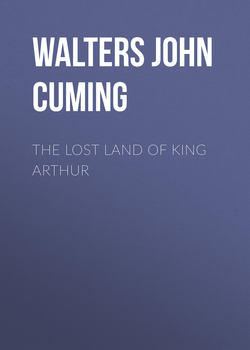The Lost Land of King Arthur

Реклама. ООО «ЛитРес», ИНН: 7719571260.
Оглавление
Walters John Cuming. The Lost Land of King Arthur
FOREWORD
CHAPTER I. OF THE KING AND HIS CHRONICLERS
CHAPTER II. OF LYONNESSE AND CAMELIARD
CHAPTER III. OF ARTHUR THE KING AND MERLIN THE ENCHANTER
CHAPTER IV. OF TINTAGEL
CHAPTER V. OF CAERLEON-UPON-USK
CHAPTER VI. OF THE ROUND TABLE AND KING ARTHUR’S BATTLES
CHAPTER VII. OF CAMELOT AND ALMESBURY
CHAPTER VIII. OF ST. KNIGHTON’S KIEVE AND THE HOLY GRAIL
CHAPTER IX. OF CAMELFORD AND THE LAST BATTLE
CHAPTER X. OF GLASTONBURY AND THE PASSING OF ARTHUR
Отрывок из книги
No pretence can be made that a complete or exhaustive history of King Arthur is given in this and the following chapters. Only parts of his story and parts of the story of his most illustrious knights are woven into this mosaic of fact and fiction. Sometimes only a few threads of the romance are to be discovered; at other times many are gathered into the fabric.
I have taken those portions only of the Arthurian fable, built upon a small substratum of historic fact, which suited the immediate purpose in view; the rest, a huge mass, which it would have been unprofitable to introduce, has perforce been omitted. The primary object has been simply to call attention to the reputed relics of the great hero, to mark some of the floating traditions of his power, and to speak of a few of the localities which bear his name or are associated with his deeds; and I have striven to add a little to the living interest in the mouldering monuments, to brush away a little of the dust of ages from existing evidences, to lift a little the veil of mystery which darkens, disguises, or shrouds the lineaments of the king. As we find him in history, and as he is represented in romance, he is so noble a figure that we should dread to lose him or the conjuring influence of his name. The proud and triumphing Roman reeled for a time under the shock of Arthur’s hosts. The Saxon felt his almost invincible power. Christendom hailed his noble order and rejoiced in his imperial sway. Now, where he ruled and made his kingdom, are submerged cities, fallen towers, the wash of waters, the “trackless realm of Lyonnesse.” The sea has swept over his territory, and the deep shadows of centuries have fallen upon his deeds. His fame has been made imperishable by mighty pens, and many a mountain fastness holds his name and gives it forth to the world; many a towering rock preserves his story; many a frowning height perpetuates his deeds; many a wild torrent proclaims his name. So by a hundred contrivances does the memory of King Arthur endure, and he looms, a giant, behind the mist of ages. Six hundred localities in the British Isles alone, it has been computed, cherish traditions of King Arthur, and his praise is sung by a multitude of voices, and in every region where Celtic influence has been felt. Such an influence as this cannot proceed wholly from the dry bones of fiction, or from the golden toys of romance. Legends gather about a great name, just as ivy covers the ruined column of old time; but the underlying base is there. Those who contend that King Arthur never lived are open to the charge of allowing the leaves of fable to hide from their eyes the ruined but giant pillar beneath.
.....
Nennius is supposed to have compiled another comprehensive history comparable with that of Gildas—Historia Britonum—the period embraced being from the days of Brute the Trojan to the year 680 A.D. But so much doubt prevails as to his work, that the history, despite the later date, has been ascribed to Gildas himself. Both may have been forgeries of the tenth or eleventh century. For five or six centuries the story of Arthur was “folk-lore,” and was preserved in snatches of song, a few fragments of which still exist. Such a legend, as Longfellow says, can only—
Songs in praise of heroes, real or mythical, always exist among rude peoples—the sagas which nations unwillingly let die. They are the repository of national history, the inspiration of an aspiring and progressive race, the embodiment of its hopes, the treasury of its traditions. Mythology, “the dark shadow which language throws on thought,” is the first outcome of mental activity and percipience—the struggle for human expression of all that is marvellous and memorable. All the early history of races is mixed and engloomed with dim allegories. Intense reverence for divinities, or the awe of them, leads to the making of fables and the reciting of marvels, in which the gods speak and act as men, or men speak and act as gods. The thoughts of primitive peoples are concentrated upon the hero, the commanding figure who typifies their desires, and about whose name cluster legends of victory. Not infrequently, divine qualities are attributed to that hero who thus looms majestically upon the horizon of history, and ultimately becomes a religion. “The gods of fable are the shining moments of great men,” Emerson said, and whether the Arthurs and Odins of mythology were men worshipped as deities, or deities divested of divinity and transformed into historic heroes, the after-ages must always have some difficulty in deciding. What we know is that the interval between language and literature is crowded with shadowy mythological lore, and little of the light flashed back from to-day can illumine the haunted, mystic, twilight time of phantom and superstition.
.....